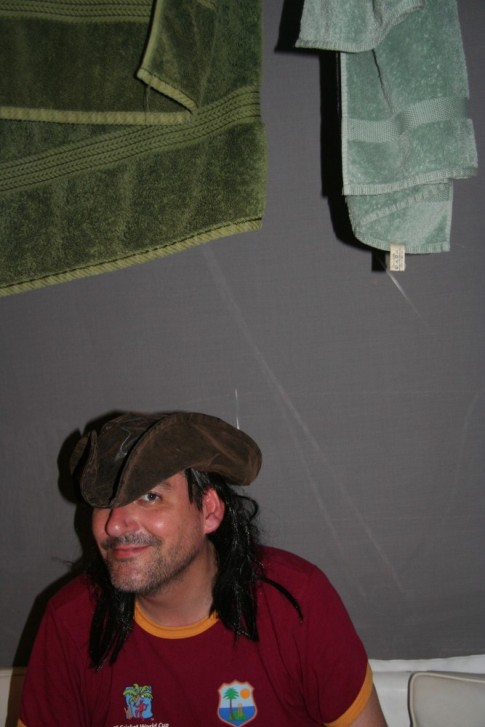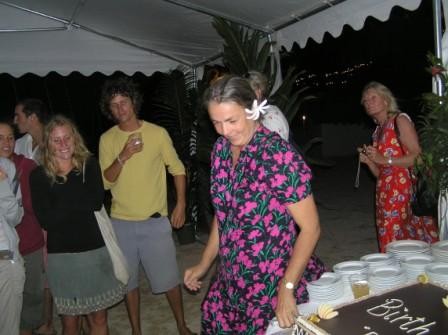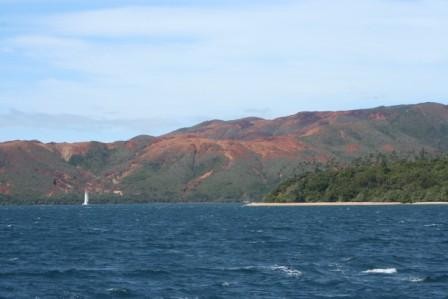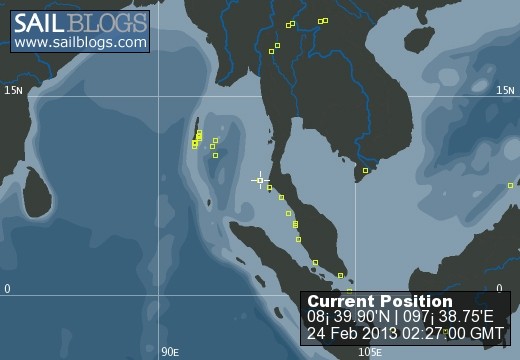
Around the World
25 July 2011 | Saumlaki
02 July 2011
03 June 2011 | Darwin
29 May 2011 | Port Essington
27 May 2011 | The Wessels
24 May 2011 | Gulf of Carpentaria
22 May 2011 | Seisia
20 May 2011 | York Peninsula
18 May 2011 | Flinders Islands
17 May 2011 | Lizard Island
14 May 2011 | Cooktown
13 May 2011 | Cairns
06 May 2011 | Cairns
02 May 2011 | Cairns
24 April 2011 | Fitzroy Island
24 April 2011 | Michaelmas Reef
22 April 2011 | Fitzroy Island
15 April 2011 | Dunk Island
15 April 2011 | Magnetic Island
15 April 2011 | Whitsundays
Safe Arrival
23 February 2013 | Similan Islands Thailand
Michael and Jackie
The wind gods were kind to us, and even the electrical storms were not too bad. We had one squall with winds of up to 28 knots but aside from that the three night passage was thankfully pretty uneventful. The Similans are about 40 miles off the coast of Thailand, and our next destination is the South of Phuket, about 60 miles in all, where we shall do some restocking.
Sadly the weather does not look that wonderful for the next few days, lots of rain and thunder storms so we will decide when to leave later.
Although further South than the Andamans the Similans still has coral and the fish life around the boat is glorious. We suspect that there may be a cool current which is saving the coral at this point. As in the Andamans most of the Thai coral has been bleached
Arrival at a mooring or anchorage, after a passage really makes us appreciate being at a standstill. We can jump off the back of the boat. Movement is easy, no bracing or keeping one hand on a firm post. The only blemishes are that we appear to be running out of gin and tea. Still life is good.
Sadly the weather does not look that wonderful for the next few days, lots of rain and thunder storms so we will decide when to leave later.
Although further South than the Andamans the Similans still has coral and the fish life around the boat is glorious. We suspect that there may be a cool current which is saving the coral at this point. As in the Andamans most of the Thai coral has been bleached
Arrival at a mooring or anchorage, after a passage really makes us appreciate being at a standstill. We can jump off the back of the boat. Movement is easy, no bracing or keeping one hand on a firm post. The only blemishes are that we appear to be running out of gin and tea. Still life is good.
Leaving India
21 February 2013 | Bay of Bengal
Michael and Jackie
Leaving India is almost as hard as arriving. I don't mean in the sentimental sense, although we were sure sad to leave the Andamans, but in the technical sense. First you proceed to the Harbour Master, and painstakingly copy out the details of all the anchorages you have been to, on to a special form, twice. This form is then cut in two, lengthways so that you have a copy and they have a copy. Then this information is used to calculate how much you should pay for your stay. A careful application of Adam Smith's Division of Labour is applied to this process. Each aspect of it has been defined, and has become the responsibility of a named individual. There is the man with the steel ruler whose job it is to tear the form neatly down the middle, there are the 3 or 4 female clerks who draw up the bill, check the bill, collect the money, write out the receipt. Each process carefully recorded in the hard back books, tied with ribbons which abound the office. Computers are less obvious. We did though spot one. This computer picks up emails from ships. Each email is dutifully recorded in a hard back book bound with ribbons. The whole process took about an hour and a half, and the cost to us was about £12, 1080.13 rupees. Unfortunately, however, the Harbour Master was out we had to wait another hour so that he could personally sign the clearance form. Everything is carried out meticulously and politely. People come and go. They stop in the office to perhaps read the paper, chat with friends. Live moves at a slow pace here. After the Harbour Master we taxied to customs, who fortunately were in, and got another clearance paper to take to immigration. Immigration then come to the dingy wharf to do the final clearance. Presumably to make sure that we really are going.
Luckily this gave us time for a superb Indian meal, tandoori prawns and mutton rogan josh washed down with some Kingfisher beer. We also stocked up on some samosas from a street seller to fuel the night watches. Perhaps a rather risky strategy. And so a final goodbye. Our taxi skirted the wandering cows, narrowly avoiding numerous disastrous collisions with tuk tuk drivers, and brought us back to the wharf. Maybe it's the horn that is sacred here not the cows. We never saw an accident but the amount of horns blaring was amazing.
So we have now left the beautiful Andamans for the 3 day journey back to Phuket and then on to Langkawi. So far all is good, lightish winds just off the aft are driving us along, and we are hoping that we can avoid forecast bad weather for the weekend
Luckily this gave us time for a superb Indian meal, tandoori prawns and mutton rogan josh washed down with some Kingfisher beer. We also stocked up on some samosas from a street seller to fuel the night watches. Perhaps a rather risky strategy. And so a final goodbye. Our taxi skirted the wandering cows, narrowly avoiding numerous disastrous collisions with tuk tuk drivers, and brought us back to the wharf. Maybe it's the horn that is sacred here not the cows. We never saw an accident but the amount of horns blaring was amazing.
So we have now left the beautiful Andamans for the 3 day journey back to Phuket and then on to Langkawi. So far all is good, lightish winds just off the aft are driving us along, and we are hoping that we can avoid forecast bad weather for the weekend
Yellow fish and deer
15 February 2013 | Cinque Islands
Michael and Jackie
The sea suddenly changed colour. The depth reading shot up. We must be over a coral bommie! Quickly engines in reverse we retreated and looked more closely. We weren't seeing a coral bommie but thousands of yellow fish. The shoal was so dense that the sea colour had changed. The depth reading was the fish, not the bottom. The bright yellow fish, each about a foot in length, continued to pass backwards and forwards in the pass between North and South Cinque island. We had stopped there to snorkel the pass after spending the night at South Cinque. We had tried anchoring in the pass the previous late afternoon but gave up after the anchor got snagged in a large piece of coral. We had to deploy the dinghy to lever the rock off the anchor.
South Cinque is a glorious white sand bay with rolling surf. The sound of the crashing waves on the beach is quite frightening even though we anchored well away from the breaking water. As the sun set we watched spotted deer feed on the vegetation which decorate the sand dunes.
We are heading for a calm anchorage on the main island, Chiryatapu, before returning to Port Blair tomorrow to do some final shopping and check out. Looking forward to visiting the bakery again!
South Cinque is a glorious white sand bay with rolling surf. The sound of the crashing waves on the beach is quite frightening even though we anchored well away from the breaking water. As the sun set we watched spotted deer feed on the vegetation which decorate the sand dunes.
We are heading for a calm anchorage on the main island, Chiryatapu, before returning to Port Blair tomorrow to do some final shopping and check out. Looking forward to visiting the bakery again!
Return to croc point
15 February 2013 | Henry Lawrence Island
Michael and Jackie
It's actually called Wreck Point. It was difficult to drag ourselves away from North Button. You just jump off the boat into a virtual aquarium. I don't think we have seen such a variety of sea life, anywhere! Just to cap the experience a couple of dolphins came to say hello, slowly circled our anchored boat before leisurely continuing their way. We sailed South calling in at South Button Island, reputed to have very good coral, but the exposed anchorage of 25m did not attract although the tiny island did.
As we approached the narrow channel between the two islands, Henry Lawrence and Outram, we caught a large barracuda, certainly more than 3 feet long. However, worried about ciguatera, a disease that reef foraging fish can carry, we threw it back in the water. The larger barracuda are prone to the disease.
The narrow channel widened where we met Kalypso, an English boat who had crossed to the Andamans with us. We had timed our arrival for high tide and deployed the kayaks quickly to explore the mangrove channels. Clouds of kingfishers, swifts and other small birds greeted us. Tiny fish swarmed through the water. The occasional unexplained splash from the enclosing mangrove trees, but thankfuly no crocodiles.
The afternoon was spent repairing the generator. It refused to start yesterday. The starter motor bolts had worked loose, plus fuel filters needed changing so all is well again. We can make electricity expensively with our engines, but the generator with the assistance of our solar panels and wind generator is by far the most effective for our energy hungry freezer.
We decided that we will head back South to the Cinque islands while there is little wind about, prior to our check out next week, and long journey to Langkawi.
As we approached the narrow channel between the two islands, Henry Lawrence and Outram, we caught a large barracuda, certainly more than 3 feet long. However, worried about ciguatera, a disease that reef foraging fish can carry, we threw it back in the water. The larger barracuda are prone to the disease.
The narrow channel widened where we met Kalypso, an English boat who had crossed to the Andamans with us. We had timed our arrival for high tide and deployed the kayaks quickly to explore the mangrove channels. Clouds of kingfishers, swifts and other small birds greeted us. Tiny fish swarmed through the water. The occasional unexplained splash from the enclosing mangrove trees, but thankfuly no crocodiles.
The afternoon was spent repairing the generator. It refused to start yesterday. The starter motor bolts had worked loose, plus fuel filters needed changing so all is well again. We can make electricity expensively with our engines, but the generator with the assistance of our solar panels and wind generator is by far the most effective for our energy hungry freezer.
We decided that we will head back South to the Cinque islands while there is little wind about, prior to our check out next week, and long journey to Langkawi.
fish, fish and fish
12 February 2013 | North Button Island
Michael and Jackie
We didn't notice at first the dark black lines at the water's edge. Fish! Tiny transparent fish in their billions, so many that they formed a black line about a foot wide, stretched the half mile or so length of the white sand spit. The long sand spit stretches out to the West of North Button Island. The most Northern of three button shaped islands in the Northern part of the Andamans. The island is uninhabited, but teems with bird life, and fish in the surrounding sea. Snorkelling in the clear water we saw lots of different fish, the most remarkable being school of metre long hump headed wrasse. Harmless but a bit scary nevertheless. They were quite happy to have us stare at them and follow them around.
The crystal clear seas hide one tragic fact though. Everywhere we have snorkeled there has been almost no live coral. The bay floors are just bleached dead coral. Apparently the coral died following a hot summer in 2008 or 2010. We were told that there is still coral below the 10 mtre mark but it is only visible to divers. The destruction of the coral must also have led to a loss of fish life as well. Despite that the islands are a beautiful site with their glorious vegetation contrasting with the marine colours.
Our friends on Storyteller departed this morning to head back to Phuket and Langkawi where they have more guests to pick up. We said our goodbyes over an excellent meal on board their boat last night. We plan to stay another week before returning.
The crystal clear seas hide one tragic fact though. Everywhere we have snorkeled there has been almost no live coral. The bay floors are just bleached dead coral. Apparently the coral died following a hot summer in 2008 or 2010. We were told that there is still coral below the 10 mtre mark but it is only visible to divers. The destruction of the coral must also have led to a loss of fish life as well. Despite that the islands are a beautiful site with their glorious vegetation contrasting with the marine colours.
Our friends on Storyteller departed this morning to head back to Phuket and Langkawi where they have more guests to pick up. We said our goodbyes over an excellent meal on board their boat last night. We plan to stay another week before returning.
Indiana Jones in the Mangroves
10 February 2013 | Henry Lawrence Island
Michael and Jackie
The crocodile's eyes moved almost imperceptibly. It slowly slid down the bank, just a slight swish as it entered the water. Quick, a sharp blow from the kayak paddle and the croc reared and then turned angrily to wait. Well almost, except we didn't actually see a saltie as the salt water crocodiles are known here. However, we were prepared - we had a plan
We had bumped the short distance North round Havelock Island's small but busy wharf and headed for the next island North. Although a short distance it was into wind and quite bumpy.
Suddenly the sea flattened and we were tucked up behind a reef on the South end of Henry Lawrence Island. The colours of the sand and the reef, contrasting with the sandstone cliffs and arches and the overhanging with the trees of the forest were absolutely magnificent.
To the West of the anchorage there is a deep cove which we explored by kayak. Past rocks cloaked with small sea birds we turned into the cove disturbing some nesting kingfishers. The cove has cliffs to East and West which enclose mangroves and deep watery passages. The water runs fast through these mini rivulets, and you paddle deeper and deeper into the darkness of the island. Sudden splashes made us think crocodiles! However, they were probably waves splashing or birds fleeing from us. Our theory that a firm blow with a paddle might dissuade a hungry croc, seemed less credible. Maybe we would just have to wrestle with the croc, a la Indiana Jones. Anyway no crocs were sighted but the jungle river feeling was stupendous.
We had bumped the short distance North round Havelock Island's small but busy wharf and headed for the next island North. Although a short distance it was into wind and quite bumpy.
Suddenly the sea flattened and we were tucked up behind a reef on the South end of Henry Lawrence Island. The colours of the sand and the reef, contrasting with the sandstone cliffs and arches and the overhanging with the trees of the forest were absolutely magnificent.
To the West of the anchorage there is a deep cove which we explored by kayak. Past rocks cloaked with small sea birds we turned into the cove disturbing some nesting kingfishers. The cove has cliffs to East and West which enclose mangroves and deep watery passages. The water runs fast through these mini rivulets, and you paddle deeper and deeper into the darkness of the island. Sudden splashes made us think crocodiles! However, they were probably waves splashing or birds fleeing from us. Our theory that a firm blow with a paddle might dissuade a hungry croc, seemed less credible. Maybe we would just have to wrestle with the croc, a la Indiana Jones. Anyway no crocs were sighted but the jungle river feeling was stupendous.
| Vessel Name: | Lady Kay |
| Vessel Make/Model: | Lagoon 380 |
| Hailing Port: | Falmouth |
| Crew: | Michael & Jackie Chapman |
Blue Waters
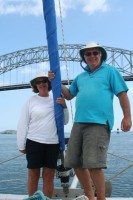
Who: Michael & Jackie Chapman
Port: Falmouth

